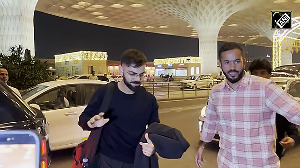Hathaway, currently director of the Asia Program at the Woodrow Wilson Center in Washington, DC, said, "The US calls for patience are not likely to satisfy New Delhi, and when Secretary Rice arrives in India she is likely to face sharp questioning about Washington's continued support for Pakistan."
But, he said, for all the talk about calling for the US to exert pressure on Islamabad to rein in the terrorists and shut down the training camps and other safe havens for terrorist groups like the Lashkar e Tayiba said to be responsible for the attacks and which that are based in Pakistan, "An examination of the very chequered US relationship with Pakistan over the years, would illustrate that we don't have nearly as much leverage over Pakistan as most people think we do."
"So at the end of the day," Hathaway told rediff.com, "It is difficult to envision any sort of scenario where we can simply snap our fingers and the Pakistanis are going to click their heels and do our bidding. It doesn't work like that any more than India would simply surrender to the dictates of Washington."
He said the US would "have to be a bit more subtle and, frankly, a bit more creative, and Washington is likely to be effective only if its pressure is applied behind the scenes. But then, the man on the street in Mumbai or New Delhi or Hyderabad, is not going to be even aware of it and therefore we get back to this perception that people in India feel that the United States has not done enough to rein in Pakistan."
Thus Hathaway, who recently returned from a trip to Pakistan to study if the population now believes its internal terrorism that's more of a threat to Pakistan than India, said while Rice's trip is a useful visit, "It is largely symbolic and not at any practical level."
"This gives her an opportunity to personally say to the Indians that we in America stand by you, we share in your sorrow and we join you in condemning this horrific action and we as much as you in India, want to find those responsible and bring them to justice," he said.
Beyond that Hathaway said, "I am not very confident that you are going to see any dramatic turnaround in Pakistan in the short-run."
"So, it's a problem without any obvious solution and the incremental steps Washington can take and should take, are not necessarily going to address these concerns raised in India about an inadequate American response," he said.
Hathaway said, he finds it "very plausible that a number of these (terror) groups -- including the Lashkar e Tayiba are to some extent, that I cannot quantify, off the reservation -- free agents of acting outside of government control or military control or ISI, or even in opposition to the wishes of the ISI and the Army."
And furthermore, he added, while the Asif Zardari government may not be on the verge of collapsing, "It clearly does not have control over the Army or the ISI and we've seen a number of examples of this just in the last couple of weeks where the civilian government says one thing and within 24 hours there is a reversal or the military authorities saying, 'Not so fast'."
Hathaway said the most recent example was "the government saying we'll send the head of ISI to New Delhi or Mumbai and immediately the military stepping in and saying, 'We're certainly not going to do that'."0
"So, I don't know a single analyst who thinks that the civilians have full control over the military or the ISI, and this is another part of the dilemma facing both New Delhi and Washington right now as to who are you going to deal with, who are you going to make demands on."
Hathaway said he could understand Prime Minister Manmohan Singh's predicament in that "on one hand he faces a potentially, extraordinarily serious crisis for which there are no good answers, and on the other hand, he's been pressed by political opponents and by a general popular opinion to do something -- to be tough, to be decisive."
"But, decisiveness might simply make matters worse. So, it's a tough call and he hardly has any maneuvering room what with the prospect of national elections next spring compounding all of this. It's a situation fraught with peril," he added.





